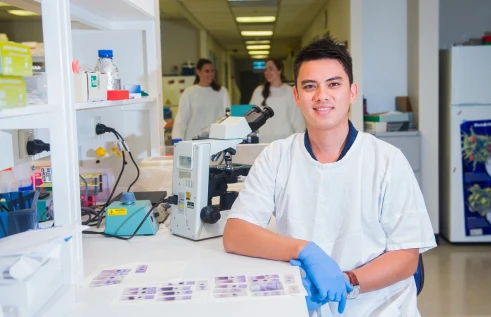Key details
Duration
Locations
Entry requirements
View full entry requirementsCredit points required
160Course code
Overview
Combining a Master of Public Health with a Master of Health Research will give greater flexibility and opportunity to your career. This double degree is a strong modern qualification that will enable you to tackle contemporary and future population health issues with high level public health and health research skills. It is also an alternative pathway to Higher Degrees by Research. This double degree will equip students with the tools to investigate, critique and respond to real-world population health problems in local and global contexts, as well as advanced knowledge and skills in health research design and evidence-based practice.
Unique features of the course include learning from acclaimed Menzies School of Health Research professionals in the specialist areas of Indigenous health, global health, public health practice and health research. Our students study epidemiology, biostatistics, quantitative and qualitative research methods. You will learn to analyse and interpret population health information, evaluate and design public health interventions and formulate evidence-based strategies to address complex health and social issues.
Apply public health approaches to:
- health promotion
- disease control
- health systems
- health policy
- decision making
- the environment and
- the sustainable development goals
Consolidate your learning by undertaking a research project supervised by an expert in the field.
This course requires a high level of academic reading and writing. Students who are not confident in their academic literacy skills are encouraged to fully utilise the university's academic support services.
Career opportunities
Graduating from this course may lead to career opportunities in non-government organisations (NGOs) and government sectors in areas such as: health research, professional health practice, health policy and planning, epidemiology, communicable and chronic disease control, community development and aid work.
Credit transfers and advanced standing
Pathways
Pathways for Higher Education to Higher Education
For information about credit transfer available to students with complete or incomplete study at this or other Institutions refer to Pathways for Higher Education to Higher Education
Credit transfer
For further information on credit transfer and how to apply visit ASK CDU
Credit transfers and advanced standing
Credit transfer
For further information on credit transfer and how to apply visit ASK CDU
Fees
Commonwealth supported places
Commonwealth Supported places are available in this course to students who meet one of the following residency requirements:
(a) be an Australian citizen, who will complete some of your course of study while resident in Australia; or
(b) a New Zealand citizen; or an Australian permanent visa holder; or an eligible former permanent humanitarian visa holder; who studies the entire course while living in Australia.
Further information about fees and charges can be found at Fees and Payments.
Non-Commonwealth supported places
Full fee paying places are available in this course.
Information about fees and charges can be found at Fees and Payments.
International tuition fees
The annual tuition fee for full time study in 2026 is AUD $34,736.00. This equates to $4,342.00 per 10 credit point unit (0.125 EFTSL).
These fees are subject to increases annually, effective at the start of each calendar year.
You can find a list of International fees and payments you can expect to pay as part of your studies in Australia. See 2026 Higher Education International Annual Tuition Fees.
CDU offers a number of scholarships to international students to assist with the cost of study.

Why study a health course at CDU?
As an increasingly in-demand industry, there's never been a better time to upskill in the field of healthcare. Advance your career with CDU's wide range of postgraduate health courses to develop specialist skills and knowledge that help you transition into leadership roles.
- #2 Australian university for postgraduate employment outcomes (GUG 2024)
- Top 5 Australian university for postgraduate teaching quality in health services and support (GUG 2024)
- Placements and research opportunities in the NT, across Australia, and around the world
- Uniquely positioned to explore Indigenous and Asia-Pacific health, tropical medicine and other issues of international importance

Why study a health course at CDU?
As an increasingly in-demand industry, there's never been a better time to find a career in healthcare. Become a qualified health professional with CDU's wide range of courses and gain the skills and knowledge to make an impact on the wellbeing of your community.
- #2 Australian university for postgraduate employment outcomes (GUG 2024)
- Placements and research opportunities in the NT, across Australia, and around the world
- Uniquely positioned to explore Indigenous and Asia-Pacific health, tropical medicine and other issues of international importance

Why study a health course at CDU?
As an increasingly in-demand industry, there's never been a better time to upskill in the field of healthcare. Advance your career with CDU's wide range of postgraduate health courses to develop specialist skills and knowledge that help you transition into leadership roles.
- #2 Australian university for postgraduate employment outcomes (GUG 2024)
- Top 5 Australian university for postgraduate teaching quality in health services and support (GUG 2024)
- Placements and research opportunities in the NT, across Australia, and around the world
- Uniquely positioned to explore Indigenous and Asia-Pacific health, tropical medicine and other issues of international importance

Why study a health course at CDU?
As an increasingly in-demand industry, there's never been a better time to find a career in healthcare. Become a qualified health professional with CDU's wide range of courses and gain the skills and knowledge to make an impact on the wellbeing of your community.
- #2 Australian university for postgraduate employment outcomes (GUG 2024)
- Placements and research opportunities in the NT, across Australia, and around the world
- Uniquely positioned to explore Indigenous and Asia-Pacific health, tropical medicine and other issues of international importance
What will I study?
The Master of Public Health/Master of Health Research is a two-year double degree. The core units cover the essential knowledge and skills of public health and health research. The choice of specialist electives provides opportunities for students to explore various specialist areas of public health and health research. The research project enables students to plan and implement a substantial research-based project in the public health or health research areas, under the supervision of an experienced researcher. The capstone units enable students to undertake significant pieces of scholarship such as an advocacy strategy and an economic proposal. Delivered externally online; some units are also offered with an internal option.
Course structure
A candidate must successfully complete units totalling 160 credit points as detailed below. All units are valued at 10 credit points unless otherwise indicated.
| Unit type | Credit Points | Specific requirements |
| Core (8 units) | 80cp | Compulsory Core units totalling 80 credit points as detailed below: Public Health PHM516 Indigenous Health PHM552 Epidemiology PHM559 Health Policy PHM567 Public Health Health Research PHM526 Research Design PHM527 Research, Ethics and Impact (new title 2021) PHM553 Biostatistics PHM588 Qualitative Research (new title 2021) |
| Specialist Electives (4 units) | 40cp | Specialist Elective units totalling 40 credit points selected from ANY of the following streams. (Students are advised to choose electives that will build content knowledge in the intended area of research) Public Health Stream PHM523 Health Promotion PHM529 Sexual and Reproductive Health PHM536 Health Systems, Planning and Evaluation (new title 2020) PHM592 Global Health ENV513 Environmental Planning and Policy orENV508 Geographic Information Systems DEM511 Emergency and Disaster Management in Context PHM554 Public Health Economics and Decision Making (new title 2020) PHM566 Chronic Conditions Control PHM593 Tropical Child and Adolescent Health (new title 2020) Health Research Stream PHM517 Public Health Anthropology PHM519 Clinical Trials and Other Intervention Studies (replaces PHM524 from 2021) PHM525 Indigenous Health Research PHM570 Epidemiology and Control of Communicable Diseases |
| Research (1-2 units) | 40cp | Research units totalling 40 credit points: 2 x PHM820 Research Project (Part Time) (20 credit point repeatable unit) Or 1 x PHM840 Research Project (Full Time) (40 credit points) |
| Course Total | 160cp |
Course Rules (unless otherwise indicated in the above course structure) (160cp)
- See the Higher Education Course Rules (Award Requirements) in the Units and Courses Policy.
Study plan
STUDENTS COMMENCING IN SEMESTER 1
The Recommended Study Plan provided below is suitable for a student enrolling in a full-time study load. Students entering this course with advanced standing, or wishing to vary their study plan due to work, personal, financial or other reasons should use the table as a guide to create an individual study plan.
When designing an individual study plan:
- maintain the basic order in which units are to be attempted; and
- check the prerequisite and assumed knowledge for each unit as some units assume you have completed foundation unit/s in the unit area at a lower level.
| Legend: | CO = Core Unit | R = Research | SE = Specialist Elective |
DOMESTIC STUDENT
(Note: student visa holders must follow the International student study plan for INTERNATIONAL STUDENTS below)
Full-Time Study Plan
| Semester 1 | Semester 2 | ||
| Year 1 | |||
| PHM516 Indigenous Health | CO | PHM527 Research, Ethics and Impact (new title 2021) | CO |
| PHM526 Research Design | CO | PHM553 Biostatistics | CO |
| PHM552 Epidemiology | CO | PHM559 Health Policy | CO |
| PHM567 Public Health | CO | PHM588 Qualitative Research (new title 2021) | CO |
| Year 2 | |||
| Specialist Elective | SE | PHM840 Research Project (40cp) | R |
| Specialist Elective | SE |
| |
| Specialist Elective | SE |
| |
| Specialist Elective | SE |
| |
Specialist Elective Unit Availability
| Semester 1 | Semester 2 |
Public Health Stream Health Research Stream | Public Health Stream Health Research Stream |
| Legend: | CO = Core Unit | R = Research | SE = Specialist Elective |
INTERNATIONAL STUDENT
(Note: International student visa holders are required to enrol internally on a full-time load each semester and follow the relevant study plan)
Full-Time Study Plan
| Semester 1 | Semester 2 | ||
| Year 1 | |||
| PHM567 Public Health | CO | PHM559 Health Policy | CO |
| PHM592 Global Health | SE | PHM588 Qualitative Research (new title 2021) | CO |
| PHM552 Epidemiology | CO | PHM553 Biostatistics | CO |
| PHM526 Research Design | CO | PHM527 Research, Ethics and Impact (new title 2021) | CO |
| Year 2 | |||
| PHM516 Indigenous Health | CO | PHM840 Research Project (40cp) | R |
| DEM511 Emergency and Disaster Management in Context | SE |
| |
| ENV513 Environmental Planning and Policy OR ENV508 Geographic Information Systems | SE |
| |
| Specialist Elective | SE |
| |
Specialist Elective Unit Availability
| PHM519 Clinical Trials and Other Intervention Studies PHM523 Health Promotion PHM536 Health Systems, Planning and Evaluation (new title 2020) PHM554 Public Health Economics and Decision Making (new title 2020) PHM566 Chronic Conditions Control |
_____________________________________
STUDENTS COMMENCING IN SEMESTER 2
The Recommended Study Plan provided below is suitable for a student enrolling in a full-time study load. Students entering this course with advanced standing, or wishing to vary their study plan due to work, personal, financial or other reasons should use the table as a guide to create an individual study plan.
When designing an individual study plan:
- maintain the basic order in which units are to be attempted; and
- check the prerequisite and assumed knowledge for each unit as some units assume you have completed foundation unit/s in the unit area at a lower level.
| Legend: | CO = Core Unit | R = Research | SE = Specialist Elective |
DOMESTIC STUDENT
Full-Time Study Plan
| Semester 1 | Semester 2 | ||
| Year 1 | |||
| PHM527 Research, Ethics and Impact (new title 2021) | CO | ||
| PHM553 Biostatistics | CO | ||
| PHM559 Health Policy | CO | ||
| PHM588 Qualitative Research (new title 2021) | CO | ||
| Year 2 | |||
| PHM516 Indigenous Health | CO | Specialist Elective | SE |
| PHM526 Research Design | CO | Specialist Elective | SE |
| PHM552 Epidemiology | CO | Specialist Elective | SE |
| PHM567 Public Health | CO | Specialist Elective | SE |
| Year 3 | |||
| PHM840 Research Project (40cp) | R | ||
Specialist Elective Unit Availability
| Semester 1 | Semester 2 |
Public Health Stream Health Research Stream | Public Health Stream Health Research Stream |
Entry requirements
Admission criteria
Successful completion of one of the following:
- a recognised bachelor degree or a graduate diploma or masters degree in a related area; or
- a recognised bachelor degree plus an honours degree or a graduate diploma or masters degree in a non-related area.
Related areas include: public health, health science, primary health care, medicine, social science or health promotion.
Note: Bachelor of Nursing is not an approved degree for this course. Applicants with a degree in this field are encouraged to apply for either the Graduate Diploma of Health Research or Public Health. Applicants with extensive experience in rural and remote practice may be assessed on a case-by-case basis.
Applicants who have completed Charles Darwin University's Graduate Certificate of Infectious Disease Prevention and Control (UIDPC1) or Graduate Certificate of Epidemiology (UEPID1) are also eligible for entry.
Essential requirements
English language requirements
DOMESTIC STUDENTS
To gain entry into Charles Darwin University, all Higher Education applicants must satisfy the University's English Language Proficiency Requirements for their chosen course of study. All applicants will be required to supply evidence of this at the time of application.
The minimum English language requirement for this course can be met by evidencing of one of the following:
| Year 12 | Successful completion of Year 12 within Australia, or an equivalent qualification from an approved country where English is the official language (refer to our approved standard and extended lists included below). |
| 0.5 FTE Higher Education Study | Successful completion of at least 0.5FTE of higher education study from Australia or an approved country where English is the official language (refer to our approved standard and extended lists included below). If studies were completed from a country on the extended list, they must have been completed within the past five (5) years. |
| CDU Enabling Course | Successful completion of a Charles Darwin University enabling program of at least 0.5FTE (40 credit points). |
| TAFE Qualification | Successful completion of a recognised TAFE qualification at a Certificate III level or higher from Australia. |
| AHPRA Registration | Current AHPRA registration as a Division 1 or Division 2 nurse. Registration must be current at the time of course commencement. |
| English Test^ | Completion of an approved English test within two years of commencement, meeting the minimum scores outlined in the table below. |
^ Minimum Requirements for English Tests:
| Postgraduate requirements | Undergraduate requirements | |
| CDU ELICOS - English for Academic Purposes | Successful completion of EAP004 | Successful completion of EAP003 |
| International English Language Testing System (IELTS) Academic test | Overall minimum: 6.5 No band below: 6.0 | Overall minimum: 6.0 No band below 6.0 |
| Cambridge English: Advanced (CAE) | Overall minimum: 176 No skill below: 169 | Overall minimum: 169 No skill below 169 |
| Pearson Tests of English (PTE) Academic | Overall minimum: 58 No score below 50 | Overall minimum: 50 No score below: 50 |
| Test of English as a Foreign language | Overall minimum: 79 Minimum writing score: 21 | Overall minimum: 60 Minimum writing score: 21 |
IELTS One Skill Retake is accepted, allowing candidates to retake a single skill within 60 days of sitting their initial test. One Skill Retake results are valid for two years from the date of the first test (not from the date of the Retake test) to the date of commencement at CDU.
CDU accepts combined results from two test sittings of IELTS Academic, PTE Academic, or TOEFL, taken within a six-month period, if:
- Both tests were under the same testing system; and
- The overall score in both tests meets the overall minimum; and
- The applicant achieved the section minimum for each section in at least one test.
Recognised English-speaking countries:
| Standard List | Antigua and Barbuda, Australia, Barbados, British Virgin Islands, Canada, Ireland, New Zealand, Singapore, South Africa, United Kingdom, United States of America. |
| Extended List | Bermuda, Botswana, Cayman Islands, Ethiopia, Fiji, Kenya, Malawi, Malta, Mauritius, Seychelles, St Vincent and the Grenadines, Tanzania, Trinidad and Tobago, Vanuatu, Zimbabwe. |
For further details on the English requirements for CDU courses, please refer to the CDU English Language Proficiency Policy.
INTERNATIONAL STUDENTS
To gain entry into Charles Darwin University, all Higher Education applicants must satisfy the University's English Language Proficiency Requirements for their chosen course of study.
The minimum English language requirement for this course is met by either undertaking previous education from an English-speaking country or undertaking one of the following English language tests and obtaining the minimum requirements listed below.
| CDU English for Academic Purposes 4 (ZEAP40) | Successful completion of EAP004 English for Academic Purposes 4 |
| IELTS Academic Module (including One Skill Retake) | A minimum overall score of 6.5 with no band less than 6.0. |
| Cambridge Advanced English (CAE) | A minimum overall score of 176, with no skill below 169. |
| Common European Framework Certificate of English Proficiency | A minimum overall grade of C1, valid for three years from the date of the test to the date of commencement at CDU. |
| Pearson Test of English (PTE) Academic module | A minimum overall score of 58 with no score lower than 50. |
| TOEFL Internet-based Test (iBT) | A minimum overall score of 79 with a minimum writing score of 21. |
* All tests are valid for two years from the date of the test to the date of commencement at CDU, unless otherwise specified.
* Where applicable, international applicants must also satisfy the Department of Home Affairs (DHA) English language requirements for student visa applications.
Do you have a question regarding English requirements at CDU? Please email: international@cdu.edu.au.
The people-first approach to flexibility and supportive learning environment at CDU meant I could find a balance with study, work and family life.
Nikki
CDU student

My advice for anyone who is considering studying a health or science degree at CDU is if you are thinking about it, just do it.
Nishat
CDU student

The people-first approach to flexibility and supportive learning environment at CDU meant I could find a balance with study, work and family life.
Nikki
CDU student

My advice for anyone who is considering studying a health or science degree at CDU is if you are thinking about it, just do it.
Nishat
CDU student

Course details
Accreditation
This course is accredited by the University in accordance with the Higher Education Standards.
Australian qualification framework
This course is recognised in the Australian Qualifications Framework at Level 9.
Additional information
Contact details
For further information about the course, enrolment procedures, closing dates and other administrative issues please contact Student Central on:
You make CDU
Together we are a positive force for change in our communities and the world.
You make CDU
Our students choose to study with us because we share the same vision – to make a positive change. Whatever your motivation is, we can guide you in the right direction.
You make CDU
Together we are a positive force for change in our communities and the world.
You make CDU
Our students choose to study with us because we share the same vision – to make a positive change. Whatever your motivation is, we can guide you in the right direction.
How to apply
There are many ways to apply to CDU. The method you use depends on your course type, where you live and whether you are a new or returning student to CDU.
Remember to apply early for your best chance at securing an offer to study with us.
SATAC
SATAC is the application channel for residents of NT, ACT, SA, WA, QLD, VIC, NSW or TAS.
International applications
Applications must be submitted online through our application portal, Studylink. You'll need a valid email address to create your online account. Once you have started your application, you will be able to save it and resume it later. There is no application fee when you apply online.
You may be able to lodge a direct application; however, there may be restrictions on your geographic location. If you cannot submit a direct application via the application portal, please apply through one of our registered agents.



Share this course